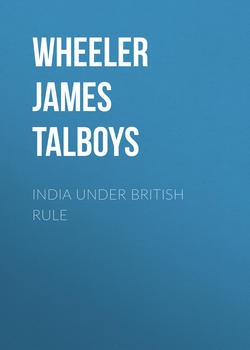India Under British Rule

Реклама. ООО «ЛитРес», ИНН: 7719571260.
Оглавление
Wheeler James Talboys. India Under British Rule
PREFACE
PART I.—EAST INDIA COMPANY
CHAPTER I.—FIRST PERIOD: FACTORIES, FORTRESSES, TOWNS.—1600-1756
CHAPTER II.—SECOND PERIOD: BENGAL PROVINCES.—1756-1798
CHAPTER III.—THIRD PERIOD: IMPERIAL GOVERNMENT.—1798-1836
CHAPTER IV.—FOURTH PERIOD: RISE TO ASIATIC POWER.—1836-56
CHAPTER V.—SEPOY REVOLT: BENGAL, DELHI, PUNJAB.—1857
CHAPTER VI.—SEPOY REVOLT: NORTH WEST, CAWNPORE, LUCKNOW.—1857-58
PART II.—THE BRITISH CROWN
CHAPTER THE LAST.—CONSTITUTIONAL GOVERNMENT.—1858-1886
INDEX
Отрывок из книги
The rise of British rule in India is a problem in history. A single association of British traders established factories which grew into fortresses, and governed native towns which became the capitals of a British empire. The march of events is without a parallel in the annals of the world. In 1600 the East India Company obtained from Queen Elizabeth a charter of exclusive rights to trade in the Eastern seas. In 1612 it established its first factory at Surat. In 1639 it began to build a fortified factory at Madras, whilst a Hindu population of weavers and other manufacturers grew up by its side. Before the beginning of the eighteenth century, before Queen Anne ascended the throne of Great Britain, the British settlements at Madras, Bombay, and Calcutta had each a fortress and a town. How Hindu and Mohammedan populations were ruled by British traders will be told in the present chapter. How the British traders acquired provinces and established an empire belongs to the after chapters.
§1. In 1600 the whole of Northern India was under the dominion of a Mohammedan sovereign, known as the Great Mogul. His revenues and armies were the marvel of Europe. His empire extended from the mountains of Cashmere to the Bay of Bengal, from the slopes of the Himalayas to the tableland of the Deccan. It covered large Hindu populations and many Hindu principalities, for throughout this vast area the Great Mogul was sovereign lord of all, the emperor, the Padishah.
.....
Colonel Clive marched on to Murshedabad, and installed Mir Jafir on the throne as Nawab of Bengal, Behar, and Orissa. Clive, and Clive alone, was the lord paramount of the hour, the hero of Plassy, the invincible warrior. The money and jewels in the treasury at Murshedabad were lavished by Mir Jafir on Colonel Clive and his party. The British officers of the army and fleet received large donations. One million sterling was given to the East India Company, another million sterling to the inhabitants of Calcutta—European and Asiatic. A hundred boats loaded with silver went down the river from Murshedabad to Calcutta, followed by the curses of the grandees; whilst the sight of the boats approaching Calcutta was hailed with the joy of men who had escaped shipwreck. "For once," says a contemporary, "and only for once, the people of Calcutta were all friends."
§2. The battle of Plassy was a British triumph, but it entailed enormous responsibilities. Colonel Clive had raised up a Nawab to be absolute ruler of territories larger than Great Britain and Ireland, and far more populous. Bengal, including the delta of the Ganges, was one of the most fertile regions in the world, whilst the inhabitants were most submissive and easily governed. For centuries the Bengalis had been oppressed by foreigners—Turk, Afghan, Abyssinian and Mogul. The revenues, however, had been collected by Hindu officials, as being at once more exacting in their demands, and more easily stripped of their ill-gotten gains.
.....